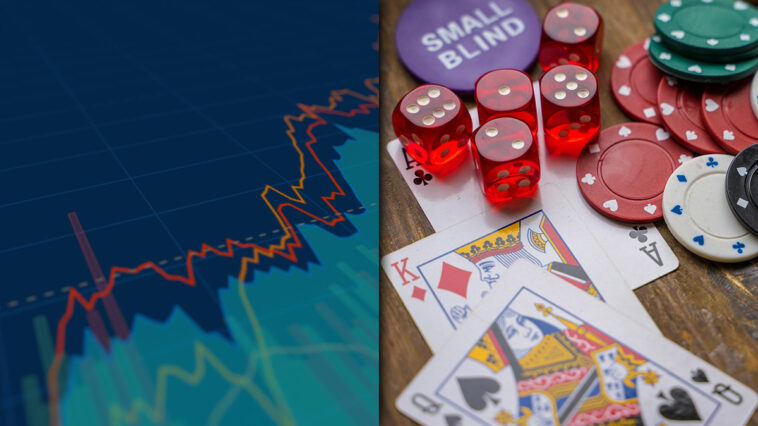In the wake of GameStop’s epic climb from just $18 per share to a peak of $483 in January of this year, interest in the stock market understandably skyrocketed. As members of a Reddit forum on investing gambled on that historic “short squeeze,” major media outlets dubbed Wall Street a de facto casino.
The metaphor was an apt one too, what with casino gamblers and investors sharing a passion for putting money on the line, evaluating long-term value, and relying on their wits to en route to winning big. Here are five reasons why success on the casino floor doesn’t apply to trading stocks.
1 – Gamblers Aren’t Prepared for the Patience Needed
Unless you’re engaged in what Wall Street types call high-volume trading – essentially, programming a computer to buy or sell stocks in a matter of seconds – investing in the market is all about patience.
All of the GameStop hubbub aside, most stocks which aren’t subject to Reddit-fueled market manipulation will never climb by hundreds of dollars over the course of a few days or weeks. Instead, investments in companies with sound business plans and solid financials will yield incremental profits as many months and even years progress.
But when you’re gambling in a casino, the back and forth between bettors and the house takes place at a frenetic pace. Just think about how many blackjack hands or roulette spins can be made in a single 60-minute span. Add bet sizing to the equation, and even casual gamblers can run through thousands of dollars in cumulative action during a daily session.
Knowing this, it’s only natural for experienced gamblers to feel a sense of boredom and restlessness when they make their first stock purchases. After refreshing their “Positions” page over and over again – and watching the stock’s price barely budge one way or another – gamblers accustomed to moving money quickly can easily become frustrated.
If a slot machine regular sat down and made 100 spins, but always seemed to break even in the end, they’d likely get up and find a different game. And while that approach can work in the casino, it’s simply untenable in the investment world.
Unless you’re prepared to wait out the long haul, trading stocks probably isn’t the right hobby to pursue.
2 – Gamblers Have a Distorted View of Risk vs. Reward Evaluation
Casinos love to tout the payout odds offered on various games and wagers. Hoping to entice new players to give the game a shot, the house makes sure everyone around knows that you’ll get 3 to 2 on a natural blackjack, 9 to 1 on the “Hard 8” in craps, and even 35 to 1 for a single number hit on the roulette wheel.
And in the mind of many recreational gamblers, those posted payout odds become engrained as a legitimate way to evaluate risk / reward ratios:
“I have $10 on the Hard 8 here, so I’m risking that to win $90 more… sure, it’s a longshot, but I’m happy with that return if I get lucky.”
The only thing is, rolling a perfect 4-4 to land the Hard 8 only happens once in every 10 rolls. With true odds of 10 to 1 against, and inferior payout odds of only 9 to 1, craps players aren’t getting the correct return relative to the risk they incur on one of the game’s most popular wagers.
This discrepancy can be found on almost every bet offered on the casino floor too. In roulette, the 35 to 1 payout odds may seem pretty sweet, but you’ll only have a one in 37 shot to hit on the European single-zero wheel, and one in 38 odds on the American double-zero version.
Whenever the casino takes a bet on these terms, it creates an inherent statistical advantage known as the house edge. For bettors backing the Hard 8, they face a steep house edge of 9.09 percent, while single number bettors face a house edge of 5.26 percent on the widely played double-zero wheel.
In other words, for every $100 you wager on Hard 8 longshots, the casino can expect to win $9.09 over the long run thanks to that difference between the bet’s true odds and payout odds.
On the other hand, these dynamics simply don’t apply when you purchase shares of stock on the open market. The amount of money you put at risk will either generate a return… or it won’t. And as for that return, you might double, triple, or multiply your investment by 10, but you can’t determine that outcome with any level of certainty.
As you might suspect, gamblers accustomed to dealing with preset payout odds and binary win / loss outcomes aren’t always comfortable dealing with the market’s inherent uncertainty.
3 – Gamblers Rely on Having Some Semblance of Control
Continuing in that vein, gamblers who prefer skill-based games like blackjack and video poker pride themselves on mastering basic strategies.
By analyzing the various starting hand vs. dealer up card scenarios, and memorizing the most mathematically correct decisions for each scenario, blackjack players can whittle the house’s edge down to under 0.50 percent. Similarly, video poker players study basic strategy charts which run through the most profitable hold / discard decisions based on their five-card starting hand. In doing so, they shave the house edge down to the sub-0.50 percent range – and even give themselves an edge in certain variants like Deuces Wild.
For this reason, many casino gamblers stick solely to games where skill and strategy are paramount. Of course, random variance in the short-term means they’ll still lose hands even after playing them perfectly. But over the long haul, consistently making statistically correct plays means they’ll likely wind up in the black when it’s all said and done.
Taking a skill game gambler and throwing them to the wolves of the stock market is akin to asking them to play slot machines or roulette. Suddenly, their ability to exert influence on the outcome has been removed from the equation. Their chosen stocks will either flourish or flounder based on external, market-based variables – and just like in a game of chance, there’s nothing the investor can do about it but watch and hope.
4 – Gamblers Prefer Short-Term Wins to Long-Term Plays
Speaking of slot machines, the main reason why so many millions of gamblers flock to the ultimate game of chance is the potential for massive, life-changing jackpot payouts.
Thanks to the advent of wide area progressive jackpot networks, popular slots can put million-dollar jackpots up for grabs on every single spin. Naturally, the overwhelming majority of those spins – for perspective, the famous Megabucks slot pays out its eight-figure jackpot at a rate of 1 in 49,836,032 spins – fail to trigger the jackpot. But slot players keep spinning away because maybe, just maybe, the next spin might be the one that makes all the others before well worth it.
Today, even table games like Three Card Poker offer huge progressive jackpots when statistically improbable hands are dealt.
And sure enough, when a jackpot is won, the casinos make sure to sound the alarm (literally in many cases) to let every player present know that the improbable is still possible.
For gamblers who spend their days chasing jackpots, the notion of waiting long periods to see their stock’s price merely double (a great return mind you) just doesn’t add up. They’re interested in splashy home runs, not measly singles through the hole, so investing will never provide the thrill of the chase that gambling does.
5 – Success in the Casino Doesn’t Equal Success Elsewhere
On a final note, gamblers interested in trading stocks should remember one basic rule – beating the market is even harder than beating the casino.
Unless you’re willing to put in the time and energy to educate yourself on every aspect of investing in a company, you’re likely doomed to fail. Time and time again, even highly educated traders armed with all available resources find themselves in the red. This stuff is serious business, and for those who don’t take investing seriously, the money can quickly dry up like a spilled drink on the scorching Las Vegas sidewalk.
Unfortunately, gamblers who find success on the casino floor often conflate their winning ways with intelligence and ability. They forget that gambling games are designed to create short-term winners, before turning those winners into losers over the long run. Overconfident and brimming with enthusiasm, these folks are usually in for a rude awakening when they start dabbling in stocks.
Conclusion
After the GameStop surge made headlines worldwide, it’s easy to see why so many people are firing up RobinHood accounts and making their first trades. And indeed, exploring a new interest in the investment market can be a worthwhile educational experience.
With that said, believing you can beat the market simply because you’ve done well as a gambler is a recipe for financial disaster. If you want to invest and earn passive income on the side, by all means do so, but don’t do it based on your casino gambling bona fides.
Please Note
The author is not an investment expert by any means, simply a gambling industry expert who enjoys recreational day-trading from time to time. With that in mind, this site must remind readers that investing in securities always involves risk, including the risk of lost principle. As with gambling, you should always invest responsibly and perform your own due diligence before placing any stock market investments.
Michael Stevens
Michael Stevens has been researching and writing topics involving the gambling industry for well over a decade now and is considered an expert on all things casino and sports betting. Michael has been writing for GamblingSites.org since early 2016. …





